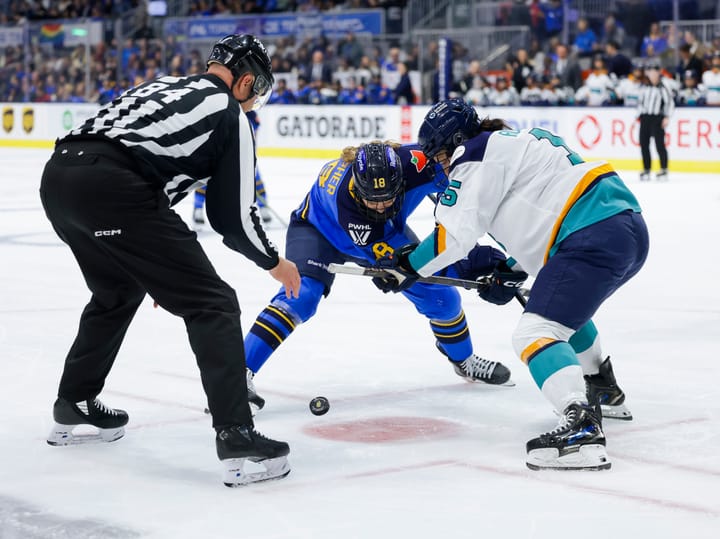PHF announces option for players to disclose salary
Today, the Premier Hockey Federation announced that its players will have the option to disclose their salaries via a consent form that accompanies their standard player agreement. This marks the first time since the 2019-20 season when players have been given the option to share their salaries.
The form allows the options to disclose the length, the estimated average annual value, and their signing bonus or for no salary information to be disclosed.
Included in the release are the salaries of 18 announced players as of July 21, as well as any signing bonus they received. For players with two-year contracts, the released numbers were for a single season.
Hannah Bates (CTW) $25,000
Ashleigh Brykaliuk (MIN) $45,000
Amanda Conway (CTW) $40,000 includes $4,000 Signing Bonus
Jonna Curtis (MIN) $50,000
Taylor Davison (TOR) $23,360
Emilie Harley (MET) $28,000
Jess Healey (BUF) $57,000 AAV includes $6,000 Signing Bonus
Tori Howran (CTW) $49,500 AAV
Carly Jackson (TOR) $29,375
Dominique Kremer (BUF) $65,000 AAV includes $6,500 Signing Bonus
Antonia Matzka (BUF) $22,000
Allie Munroe (CTW) $52,800 AAV includes $10,560 Signing Bonus
Madi Nichols (BUF) $13,500
Liz Schepers (MIN) $45,000
Emma Vlasic (CTW) $36,000
Alyssa Wohlfeiler (CTW) $42,500
Emma Woods (TOR) $44,340
Taylor Woods (TOR) $31,145
This is a landmark victory for the Players’ Association of the PHF. Prior to today’s announcement, PHF contracts had confidentiality and NDA clauses that made disclosing salaries potentially perilous to players. If they chose to disclose, like some did for my Salary Transparency Project, it made them vulnerable to being found in breach of their contract. That is no longer the case.
"I don't see a scenario where our league will go after any players (for disclosing their salaries). That sounds pretty aggressive and not the kind of relationship we want with players." -PHF Commissioner Reagan Carey
— Mike Murphy (@DigDeepBSB) July 12, 2022
(Question from @AlexAzziNBC in today's press conference)
Now, PHF players have the option to share their salaries without those clauses serving as an obstacle. The benefits of disclosed salaries are numerous.
Many athletes negotiate their own contracts and stand to gain a great deal by knowing what their peers have or had made. It establishes a marketplace (or an incomplete picture of one) that can assist players in navigating contract negotiations. It can also help players have a better idea of how much cap space teams have. Furthermore, it can keep teams accountable for spending to the cap ceiling instead of the floor. In effect, this can help level the playing field in negotiations between players and the teams they are signing with.
The Ice Garden has learned that some contract details, including relocation stipends, are not being disclosed by the league at this time. TIG has also learned that players and general managers both have to sign off on salaries being disclosed. This is a key distinction because it means that the decision to disclose is not completely up to the player. This is far from ideal and is something the PA of the PHF should revisit. If the league and its players are open to salary transparency, clubs shouldn’t be able to stand in the way of a player’s choice to disclose. It should be noted that, for the moment, we have no salaries for Boston Pride players.
taking some time to digest what this all might mean moving forward, i’ll spend some time on it at @TheIXNewsletter tomorrow like i did with noncompete clauses last week. that being said, as far as i’m aware, GMs do have to agree to allow players to disclose their salaries https://t.co/w6dd01LE0D
— eleni 👍🏼 #VIBESWATCH (@strongforecheck) July 21, 2022
We are still waiting to see how all of this shakes out but it’s safe to say that players have more resources at their disposal today than they did yesterday. That is important. Even with GMs needing to sign off on which salaries can be disclosed, we have a better picture of the landscape today than we did on Wednesday. It’s a step in the right direction.
A final note: it’s essential that people understand that a disclosed salary is not a way to measure the value or worth of any player. It’s also important to understand that there are numerous reasons (all valid) players may choose not to disclose.
TIG has asked the PHF for clarification on a few things regarding salary transparency. We will have more on this story at The Ice Garden soon.
Editor’s note: this story was updated with additional information.





Comments ()